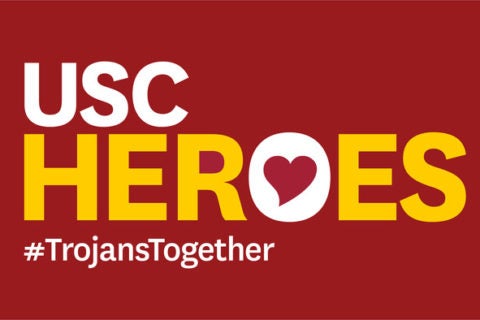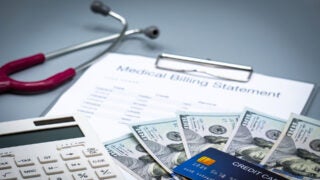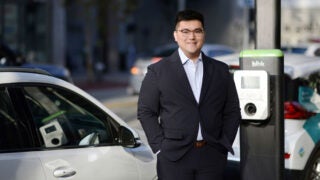Cruise ship doctor-turned-MBA student returns to duty during COVID-19
By day, Lauana Rodrigues Pereira Herbert helps her medical team respond to a global pandemic. At night, she studies for her MBA in USC Marshall’s International Business Education and Research program.
Leading a COVID-19 medical team aboard a cruise ship by day and studying for her MBA degree by night, physician Lauana Rodrigues Pereira Herbert is placing the health and welfare of others first.
Herbert has spent a decade working on cruise lines as a ship’s physician. Over the course of her career, she’s implemented numerous procedures and protocols that have improved patient health and also reduced the cost of medical supplies and equipment.
Last July she enrolled in the International Business Education and Research (IBEAR) program at the USC Marshall School of Business, a one-year, accelerated general management MBA program for mid-career professionals. Her goal: to gain the additional skills needed to transition to a career in health care consulting. While Herbert said she enjoys being a doctor, there are changes in medicine she wants to see happen and feels they are far more achievable with a business degree.
She was two-thirds through her in-person studies when the coronavirus broke out. “It made me anxious. I wanted to help, but legally I can’t work here,” said Herbert, who is from Brazil.
When COVID-19 was discovered on a cruise ship operated by her former employer, everything changed.
“I got a call that conditions were extremely bad aboard a ship in San Diego,” she said. “They needed a doctor who could lead internal and external teams and liaise with the Centers for Disease Control and Prevention (CDC) and a number of government and non-government entities.”
Former cruise ship doctor gets clearance to ‘sail’ again
So why approach Herbert? Given the current crisis and its resulting circumstances, reaching out to her was a logical and expedient decision.
First, working aboard a commercial ship requires a seafaring safety certification, which can take a week or more to earn. On top of that, a combination of industry travel bans, closed consulate offices and a CDC no-sail order had made it virtually impossible for cruise operators to relocate personnel.
Those barriers notwithstanding, the decision also had a lot to do with Herbert earning her MBA. Beyond clinical expertise, her former employer needed other essential skills she’d been honing — operations and supply chain management, communications, mediation — all critical for coordinating with diverse stakeholders like the CDC, the Coast Guard, the Food and Drug Administration (FDA), the city of San Diego and local hospitals.
One big problem remained: how to get Herbert clearance to work in the United States. USC Marshall staff scrambled to find work/study options and reached across the university for ideas and assistance. In the end, the lawyers at her former employer negotiated an agreement with the CDC that has allowed her to volunteer until the end of May.
The complications of responding to COVID-19
Her exact “job”: to stabilize the current situation and comply with the CDC’s industrywide no-sail order. The order — announced mid-March and extended in April — shut down passenger operations and also implemented strict measures for cruise ships with crews still on board.
Ships are required to develop and administer comprehensive plans for preventing, detecting, responding to and containing COVID-19. They must also ensure they have enough medical staff, equipment, supplies and other resources to provide care and, if needed, be able to transfer the sick to an onshore hospital.
When Herbert reported for duty on April 4, she joined a crew of 800 from 72 countries. “Although some of them were infected with the coronavirus, the good news is that several have recovered and we have enough medical supplies and personal protective equipment on hand,” she said.
Their mood fluctuates. They’re concerned about their own health, far from home.
Lauana Rodrigues Pereira Herbert
While she said things were “as good as they could be,” she noted that it’s been mentally and emotionally hard for the crew.
“Their mood fluctuates,” she said. “They’re concerned about their own health, far from home. And with the CDC’s measures on repatriation, they’re in limbo too. They can’t disembark through commercial transportation means, so they’re dependent on the cruise lines providing private-chartered transportation or the CDC lifting its restrictions.”
A day in the life of a cruise ship doctor during COVID-19
Herbert has learned there’s no off-the-shelf job description for what she’s been asked to perform.
“This isn’t a role that existed before,” she said. “While it does rely on my clinical expertise and understanding of diseases and outcomes, it’s much more than that. It’s truly a very specific set of knowledge and skills.”
Her day starts with a medical team meeting and then revolves around helping them do their jobs.
“Their role is to focus on the health of the patients,” she said. “I manage the reporting, operations, logistics and communications, which allows them to maintain that focus. It’s a lot of coordination and mediation with shoreside and, of course, adapting to constant change.”
The crisis continues to present a number of very fluid situations, and the details surrounding them can be mind-blowing. For example, CDC guidelines and requirements can change daily, and any medication ordered has to be cleared through them, the FDA and sometimes U.S. Immigration and Customs Enforcement. Every package loaded aboard a ship must go through multiple sanitation and cleansing protocols before reaching the medical team.
“The ship is like a small city,” Herbert said. “The captain is the mayor, and I’m the director of the health department.”
Balancing full-time work and MBA study
After a full day, one would hope Herbert could put her feet up and relax with one of those fanciful cruise ship cocktails. Instead, she logs on to her computer to watch recorded classes, work on group projects and study.
“Oddly, study is therapy,” she said. “Plus, my day never really ends. At night, I’m the on-call cruise ship doctor in case of emergency.”
While Herbert admits the combination of full-time work and full-time study has been trying, she credits her MBA education for helping her manage and thrive.
“The training has certainly helped me to organize things and even mitigate some cultural clashes,” she said. “If this opportunity had come up a year ago, I wouldn’t have been as successful.”
Her classmates and USC Marshall faculty stay in touch and have offered encouraging messages and care packages of brownies and home-cooked foods.
She is amazing, so caring and willing to help despite putting her own life in danger.
Ivonne Castillo
“She is amazing, so caring and willing to help despite putting her own life in danger,” said Ivonne Castillo, IBEAR program specialist.
As Herbert thinks about the future and the effects of her shipboard COVID-19 experience, she says she’s even more resolved and confident in her decision to become a health care consultant.
“There’s a disconnect between the providers — the doctors and nurses — and the health care and hospital administrators,” she said. “They’re not speaking the same language, and the decisions being made don’t make sense. In the end, it’s costing a lot of dollars and a lot of lives.
“I want to help bridge that gap and foster greater understanding.”
Herbert returned to Los Angeles on Friday. After almost two months onboard treating numerous severe outbreaks, she was pleased to report the ship is now COVID-19 free.




